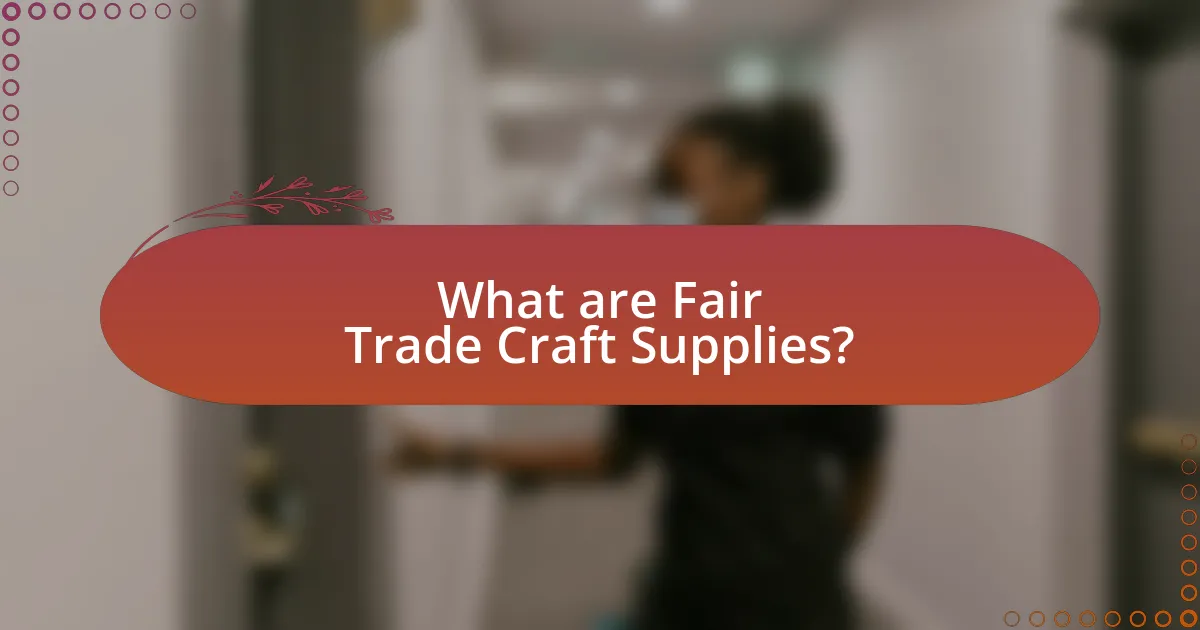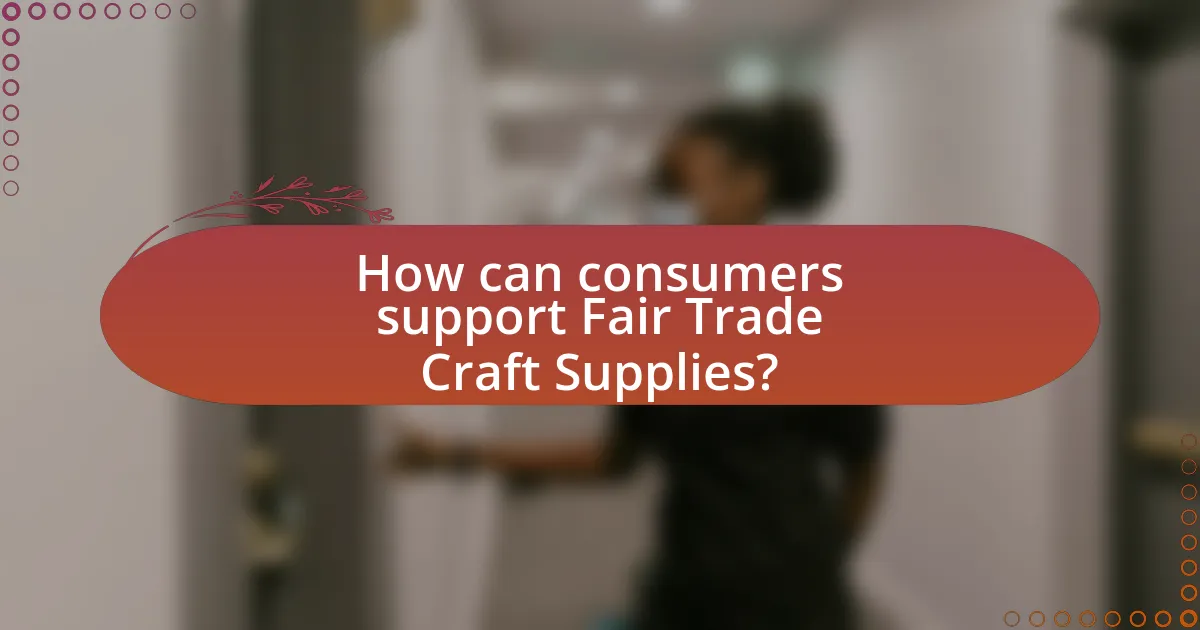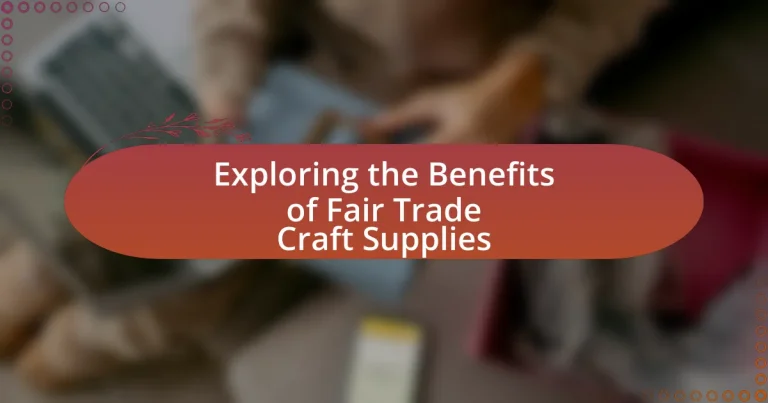Fair Trade Craft Supplies are materials produced under ethical labor practices and sustainable sourcing standards, primarily benefiting artisans in developing countries. This article explores the differences between Fair Trade and conventional craft supplies, highlighting the principles that define Fair Trade practices, such as fair wages and environmental sustainability. It discusses the impact of Fair Trade on artisans’ livelihoods and community development, as well as the environmental benefits associated with these supplies. Additionally, the article provides guidance for consumers on how to support Fair Trade Craft Supplies and the challenges faced by artisans in accessing Fair Trade markets.

What are Fair Trade Craft Supplies?
Fair Trade Craft Supplies are materials used for crafting that are produced under fair trade standards, ensuring ethical labor practices and sustainable sourcing. These supplies are typically made by artisans and workers in developing countries who receive fair wages, work in safe conditions, and are empowered through community development initiatives. Fair trade certification, such as that from Fair Trade International, guarantees that these products meet specific social, economic, and environmental criteria, promoting equitable trade relationships.
How do Fair Trade Craft Supplies differ from conventional craft supplies?
Fair Trade Craft Supplies differ from conventional craft supplies primarily in their sourcing and production practices. Fair Trade supplies are produced under ethical conditions that ensure fair wages, safe working environments, and sustainable practices for artisans, whereas conventional craft supplies often prioritize cost-cutting measures that can exploit labor and harm the environment. For instance, Fair Trade organizations adhere to standards set by the World Fair Organization, which mandates fair compensation and community development, contrasting with the often unregulated labor practices in conventional supply chains. This ethical framework not only supports artisans but also promotes environmental sustainability, as Fair Trade practices often include eco-friendly materials and processes.
What principles define Fair Trade practices in craft supply production?
Fair Trade practices in craft supply production are defined by principles such as equitable trading conditions, fair wages, and sustainable practices. These principles ensure that artisans receive a fair price for their work, which supports their livelihoods and communities. Additionally, Fair Trade emphasizes transparency in the supply chain, promoting ethical sourcing and environmental sustainability. According to the World Fair Organization, Fair Trade standards require that producers are paid promptly and fairly, which fosters economic stability and empowers marginalized communities.
How is the sourcing of Fair Trade Craft Supplies regulated?
The sourcing of Fair Trade Craft Supplies is regulated through established standards set by Fair Trade organizations, which ensure ethical practices in production and trade. These organizations, such as Fair Trade International and the World Fair Organization, implement criteria that include fair wages, safe working conditions, and environmental sustainability. Compliance with these standards is monitored through regular audits and certification processes, ensuring that suppliers adhere to the principles of fair trade. For instance, Fair Trade certification requires that producers receive a minimum price for their goods, which supports their livelihoods and promotes community development.
Why is Fair Trade important for artisans and communities?
Fair Trade is important for artisans and communities because it ensures fair wages, safe working conditions, and sustainable practices. By adhering to Fair Trade principles, artisans receive a guaranteed minimum price for their goods, which helps lift them out of poverty and fosters economic stability within their communities. For instance, a study by the World Fair Organization found that Fair Trade practices can increase artisans’ income by up to 30%, allowing them to invest in education and healthcare. This economic empowerment leads to stronger, more resilient communities that can thrive independently.
How does Fair Trade impact the livelihoods of artisans?
Fair Trade significantly enhances the livelihoods of artisans by ensuring they receive fair wages and better working conditions. This model promotes equitable trade practices, allowing artisans to earn a sustainable income that reflects the true value of their craftsmanship. For instance, Fair Trade organizations often pay artisans up to 50% more than conventional market rates, which directly contributes to improved living standards, access to education, and healthcare for their families. Additionally, Fair Trade practices foster community development by reinvesting profits into local projects, further supporting artisans and their communities.
What role does Fair Trade play in promoting sustainable development?
Fair Trade plays a crucial role in promoting sustainable development by ensuring equitable trading conditions for producers in developing countries. This approach empowers marginalized communities by providing fair wages, fostering economic stability, and encouraging environmentally sustainable practices. For instance, Fair Trade standards require producers to adhere to environmentally friendly farming methods, which helps preserve biodiversity and reduce carbon footprints. Additionally, Fair Trade organizations often invest in community development projects, such as education and healthcare, further enhancing the quality of life for these communities. According to the Fair Trade International report, Fair Trade certified producers earn 20% more than conventional producers, demonstrating its effectiveness in improving economic conditions and supporting sustainable development initiatives.

What benefits do Fair Trade Craft Supplies offer to consumers?
Fair Trade Craft Supplies provide consumers with ethically sourced materials that support fair wages and sustainable practices. These supplies ensure that artisans receive a fair price for their work, promoting economic stability in their communities. Additionally, consumers benefit from high-quality products that often emphasize craftsmanship and unique designs, reflecting the cultural heritage of the artisans. Fair Trade practices also encourage environmentally friendly production methods, which appeal to eco-conscious consumers. By choosing Fair Trade Craft Supplies, consumers contribute to social and economic justice while enjoying superior craft materials.
How do Fair Trade Craft Supplies enhance the crafting experience?
Fair Trade Craft Supplies enhance the crafting experience by ensuring ethical sourcing and quality materials. These supplies are produced under fair labor conditions, which supports artisans and communities, leading to a more meaningful connection between the crafter and the materials used. Additionally, Fair Trade products often emphasize sustainable practices, which can inspire crafters to engage in environmentally conscious projects. The commitment to quality in Fair Trade items also results in superior craftsmanship, allowing crafters to achieve better results in their projects. This combination of ethical sourcing, sustainability, and quality ultimately enriches the overall crafting experience.
What quality standards are associated with Fair Trade Craft Supplies?
Fair Trade Craft Supplies adhere to specific quality standards that ensure ethical production and sustainability. These standards include compliance with Fair Trade principles, which mandate safe working conditions, fair wages, and environmentally friendly practices. Additionally, products must meet quality benchmarks set by Fair Trade organizations, such as the World Fair Organization, which evaluates craftsmanship, durability, and the use of non-toxic materials. These criteria ensure that consumers receive high-quality products while supporting ethical labor practices and sustainable sourcing.
How does using Fair Trade Craft Supplies contribute to ethical consumerism?
Using Fair Trade Craft Supplies contributes to ethical consumerism by ensuring that artisans receive fair wages and work under safe conditions. This practice supports sustainable development and promotes social equity, as Fair Trade standards require transparency and accountability in the supply chain. For instance, Fair Trade certified products often lead to improved living standards for producers, as they receive a minimum price that covers the cost of sustainable production. Additionally, consumers who choose Fair Trade products actively participate in a system that prioritizes ethical practices over profit maximization, thereby fostering a market that values human rights and environmental sustainability.
What are the environmental benefits of Fair Trade Craft Supplies?
Fair Trade Craft Supplies provide significant environmental benefits by promoting sustainable sourcing and reducing ecological impact. These supplies are often made from organic materials, which minimizes the use of harmful pesticides and fertilizers, thus protecting local ecosystems. Additionally, Fair Trade practices encourage responsible waste management and resource conservation, as producers are incentivized to adopt environmentally friendly methods. For instance, Fair Trade certification often requires adherence to strict environmental standards, which can lead to improved biodiversity and reduced carbon footprints in production processes.
How do Fair Trade practices promote sustainable sourcing?
Fair Trade practices promote sustainable sourcing by ensuring that producers receive fair compensation and adhere to environmentally friendly practices. These practices include paying producers a minimum price that covers their production costs and providing additional premiums for community development, which incentivizes sustainable agricultural methods. For instance, Fair Trade certification requires adherence to specific environmental standards, such as reducing pesticide use and promoting biodiversity. This approach not only supports the livelihoods of farmers but also encourages the preservation of ecosystems, as evidenced by studies showing that Fair Trade farms often have higher levels of biodiversity compared to conventional farms.
What impact do Fair Trade Craft Supplies have on reducing waste?
Fair Trade Craft Supplies significantly reduce waste by promoting sustainable sourcing and responsible production practices. These supplies are often made from recycled or upcycled materials, which directly minimizes the amount of waste generated during manufacturing. For instance, a study by the Fair Trade Foundation indicates that Fair Trade practices can lead to a reduction in waste by up to 30% compared to conventional production methods, as they prioritize environmentally friendly processes and materials. Additionally, Fair Trade organizations often implement programs that encourage artisans to use leftover materials creatively, further decreasing waste.

How can consumers support Fair Trade Craft Supplies?
Consumers can support Fair Trade Craft Supplies by purchasing products that are certified Fair Trade, ensuring that artisans receive fair wages and work in safe conditions. By choosing Fair Trade items, consumers contribute to sustainable practices and empower marginalized communities. According to the Fair Trade Federation, Fair Trade practices help improve the livelihoods of producers and promote environmental sustainability, making consumer choices impactful.
What are the best practices for purchasing Fair Trade Craft Supplies?
The best practices for purchasing Fair Trade craft supplies include verifying Fair Trade certification, researching suppliers, and prioritizing transparency in sourcing. Verifying Fair Trade certification ensures that products meet established ethical standards, which can be confirmed through organizations like Fair Trade International. Researching suppliers involves checking their commitment to fair labor practices and sustainable sourcing, often found on their websites or through third-party reviews. Prioritizing transparency means selecting suppliers who openly share information about their production processes and the artisans involved, fostering trust and accountability in the supply chain. These practices contribute to supporting ethical consumption and empowering communities.
How can consumers identify certified Fair Trade products?
Consumers can identify certified Fair Trade products by looking for specific certification labels on packaging, such as the Fair Trade Certified seal or the World Fair Organization label. These certifications ensure that the products meet rigorous social, economic, and environmental standards set by Fair Trade organizations. For instance, Fair Trade Certified products guarantee fair wages and safe working conditions for producers, which is verified through regular audits.
What resources are available for finding Fair Trade Craft Suppliers?
To find Fair Trade craft suppliers, resources include online directories such as the Fair Trade Federation and the World Fair Organization, which list certified suppliers. Additionally, platforms like Etsy and Global Goods Partners feature Fair Trade artisans and products. Trade shows and fairs, such as the New York Now and the Atlanta International Gift & Home Furnishings Market, also provide opportunities to connect with Fair Trade suppliers directly. These resources are validated by their established networks and commitment to Fair Trade principles, ensuring that suppliers adhere to ethical sourcing practices.
What challenges do Fair Trade Craft Suppliers face?
Fair Trade Craft Suppliers face several challenges, including market access, pricing pressures, and compliance with Fair Trade standards. Market access is often limited due to competition from mass-produced goods, which can be cheaper and more readily available. Pricing pressures arise as suppliers strive to maintain fair wages while competing with lower-priced alternatives. Compliance with Fair Trade standards requires ongoing education and investment in sustainable practices, which can be resource-intensive for small suppliers. These challenges hinder the ability of Fair Trade Craft Suppliers to thrive in a competitive marketplace while adhering to their ethical commitments.
How do market dynamics affect Fair Trade Craft Supply availability?
Market dynamics significantly influence the availability of Fair Trade Craft Supplies by affecting supply chains, pricing, and consumer demand. Fluctuations in global demand for handmade goods can lead to increased or decreased production levels among Fair Trade artisans, impacting the overall supply available in the market. For instance, a rise in consumer interest in sustainable and ethically sourced products can enhance the availability of Fair Trade Craft Supplies, as producers respond to this demand by increasing output. Conversely, economic downturns or shifts in consumer preferences away from Fair Trade products can lead to reduced availability, as artisans may struggle to find markets for their goods. Additionally, changes in trade policies and tariffs can disrupt supply chains, further affecting the accessibility of these products.
What barriers exist for artisans in accessing Fair Trade markets?
Artisans face several barriers in accessing Fair Trade markets, including lack of awareness, limited access to resources, and stringent certification requirements. Many artisans are unaware of Fair Trade principles and the potential benefits, which hinders their participation. Additionally, limited access to financial resources and training can prevent artisans from meeting the production standards necessary for Fair Trade certification. Furthermore, the certification process itself can be complex and costly, creating an additional hurdle for small-scale artisans. According to a study by the World Fair Organization, these barriers significantly limit the ability of artisans to engage in Fair Trade, ultimately affecting their economic stability and growth.
What are practical tips for incorporating Fair Trade Craft Supplies into projects?
Incorporating Fair Trade craft supplies into projects can be achieved by sourcing materials from certified Fair Trade suppliers, ensuring ethical production practices. Start by researching local or online retailers that specialize in Fair Trade products, such as organic cotton, bamboo, or recycled materials. Use these supplies in various projects, like textiles, home decor, or jewelry, to promote sustainability and support artisans. Additionally, consider collaborating with local Fair Trade organizations to host workshops, which can educate others about the benefits of Fair Trade while utilizing these supplies. This approach not only enhances the quality of your projects but also contributes to fair wages and better working conditions for producers globally.




